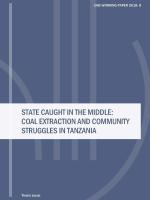State caught in the middle
The recent surge in resource nationalism in sub-Saharan Africa has increased the influence of state-owned enterprises (SOEs) in the extractive sectors. In Tanzania, the state is no longer merely attracting foreign direct investments (FDI) to the extractive sectors, it is also expanding its own share of the investments through its SOEs. In turn, this has limited the influence of foreign multinationals. Consequently, the interests of local communities are now competing with those of revived SOEs when it comes to rights to land and compensation. Under the guise of being ‘urgent projects’ of national importance, investments involving SOEs have been pushed through with limited consultations and reduced communal benefits.
This new working paper discusses the case of Ngaka coal project, an investment involving state-owned National Development Corporation (NDC) and its Australian partners. The analysis suggests that with the involvement of SOEs, local communities were compelled to support the project and dissent was not tolerated. At times excessive force to control local dissent was applied. While there has been much academic research into private mining companies’ efforts to secure community approval and social licence to operate, this paper thus asks if not the state itself, through its SOEs, is required to earn a social licence to operate? This question is the more important at a time when SOEs are becoming more important in a number of extractive industry investments.
This working paper is written by Thabit Jacob (Doctoral fellow, Roskilde University, and Lecturer, Department of Geography and Environmental Studies, University of Dodoma).
Read more
Competing energy narratives in Tanzania: towards the political economy of coal.

